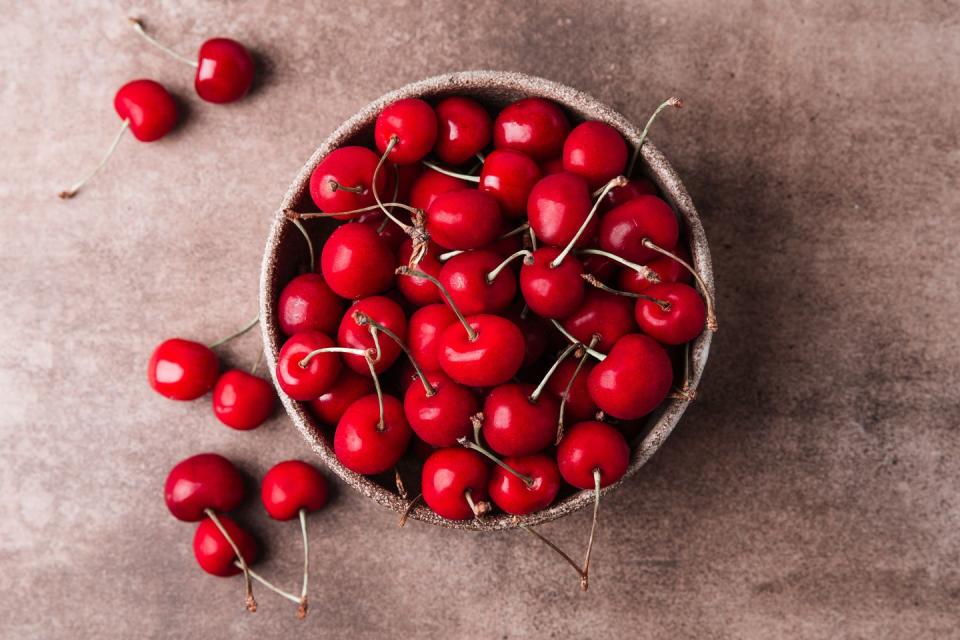Trouble Sleeping? Experts Say Cherries Are A Natural Source Of Melatonin
Watermelons and peaches are summer essentials, but cherries are the true star of the season. Their balance of sweet and tart makes them perfect for snacking and serving in classic summer desserts. As soon as we see them in our local produce department, we’re adding them to our carts all season long.
If you like cherries as much as we do, there’s a good chance you’ve overindulged a time or two. What starts as snacking on a small handful turns into nearly clearing the whole bag. But is that cause for concern? Just how healthy are cherries?
We consulted several nutritionists, dietitians, and health experts to unpack the health benefits of cherries. So whenever you’re snacking on them this summer, you know exactly what they bring to the table.
What Are The Health Benefits Of Cherries?

Cherries aren’t just a sweet treat—they’re also a great source of health-boosting compounds. “Cherries are a good source of vitamin C and potassium providing more than 10% of the daily value for these nutrients in a serving,” says Shelley Balls, MDA, RDN, LDN, a registered dietitian and nutritionist for Consumer Health Digest.
Vitamin C is an essential player when it comes to maintaining your immune system, while potassium plays a role in several parts of the body, including your muscular, circulatory, and nervous systems. Cherries are also chock full of fiber, says Avery Zenker, RD at Everflex Fitness.
"Although it’s not a vitamin or mineral, fiber plays beneficial roles in health,” Zenker says. “Fiber supports a healthy digestive system and gut microbiome. It also helps regulate blood sugar and increases satiety after eating.”
You can find potassium, vitamin C, and fiber in plenty of produce, but what sets cherries above the rest is their concentration of antioxidants.
“Cherries are rich in polyphenols like anthocyanins, hydroxycinnamic acids, and flavanols,” says Michelle Routhenstein, MS RD CDCES CDN, Preventive Cardiology Dietitian at EntirelyNourished.com. These antioxidants contributes to your overall heart health by reducing inflammation and fighting cellular damage.
You can find these nutrients in all types of cherries, but different varieties bring their own characteristics to the table.
“Typically the darker the cherry the more polyphenols and antioxidants there will be in the cherry,” Balls says.
Tart cherries, in particular, have a high concentration of antioxidants like melatonin that can help to work as a sleep aid—which is why many TikTok users swear by its juice as part of the viral sleepy girl mocktail.
But that doesn’t mean cherries with lower concentrations of antioxidants are less valuable to your overall diet. Elyse Wagner, MS, CN, LMHCA says that sweet cherries are “great for boosting energy and providing a natural source of sugar.”
What Is The Best Way To Eat Cherries?

Like with any fruit, the best way to maximize the nutritional benefits is by eating them raw. “Raw cherries preserve most nutrients, including vitamin C and anthocyanins, whereas cooking can significantly reduce vitamin C and anthocyanins levels due to its sensitivity to heat and water solubility,” says Routhenstein.
In many recipes, like jam or pie filling, more sugar is often added to improve the flavor or consistency. While you should certainly be able to enjoy these treats, it is worth consuming them in moderation.
Cherry juice, while purported to be a sleep aid, isn’t the most efficient use of the fruit’s health benefits. Removing the pulp also removes the fiber, which concentrates the sugar, causes your body to digest it more quickly, and spikes your blood sugar.
Nutritionists and health experts agree that cherries offer plenty of health benefits, but you should still be mindful while consuming them.
“It’s possible to overdo it on any food, including cherries,” says Zenker. Instead, experts say that they should work in tandem with other foods. “It's important to maintain a diverse diet to ensure adequate nutrient intake and optimize overall health,” Routhenstein adds.
You Might Also Like


